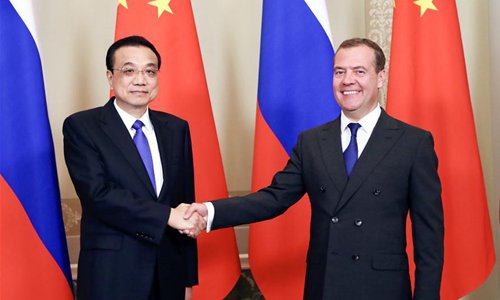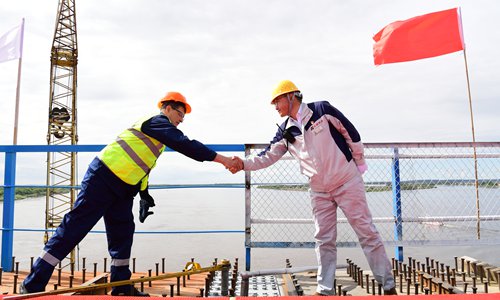China-Russia relations reach ‘special level’
By Wang Wenwen Source:Global Times Published: 2019/9/18 21:03:41
Joint space exploration, digital economy deliver highlights of exchanges

Chinese Premier Li Keqiang and his Russian counterpart Dmitry Medvedev co-chair the 24th regular meeting between Chinese and Russian heads of government in St. Petersburg, Russia, on Tuesday. Photo: Xinhua
China and Russia are expecting a strong momentum for high-quality cooperation, characterized by projects such as space research and the digital economy, as bilateral ties reach a "new and special" level during the three-day visit of Chinese Premier Li Keqiang to Russia.
Li is expected to meet Russian President Vladimir Putin on Wednesday and the meeting will highlight the fact that the Chinese-Russian relations "have entered a new, special level," Russian News Agency TASS reported.
Li's visit, at the invitation from Russian Prime Minister Dmitry Medvedev, began Monday.
On Tuesday, Li and Medvedev co-chaired the 24th regular meeting between Chinese and Russian heads of government.
After the meeting, the two leaders signed a joint communiqué and a series of cooperative documents concerning investment, agriculture, energy and scientific innovation.
Li's visit comes ahead of the 70th anniversary of the establishment of the China-Russia diplomatic ties.
It is also a continuation of the positive momentum during President Xi Jinping's June visit to Russia when the two top leaders upgraded bilateral ties to a comprehensive strategic partnership of coordination for a new era.
"After the June visit, both Chinese and Russians are more eager for real business than before, as we have seen in the cases of strategic bombers and the Amur Bridge project," Yury Tavrovsky, a professor at Russian People's Relationship University, told the Global Times on Wednesday.
The construction of the bridge, the first to connect the two countries, is expected to complete in 2020.
In July, China and Russia conducted their first joint strategic patrol in Northeast Asia, with the Chinese side dispatching two H-6K bombers and the Russian side dispatching two Tu-95 bombers.
Pragmatic cooperation between China and Russia occur in multiple dimensions of high quality, Li noted at a press conference after meeting his Russian counterpart on Tuesday.
"China and Russia have not only made breakthroughs in traditional realms such as energy, but also have notable highlights in emerging areas such as cross-border e-commerce and scientific innovation," the Chinese premier said.
In 2018, trade between China and Russia hit a record of $107 billion with a surge of 27.1 percent.
Under the new documents, China and Russia will strive to double bilateral trade by 2024, a goal set by the two countries' top leaders during Xi's Russia visit in June.

Workers from China and Russia shake hands after the two ends of the Blagoveshchensk-Heihe highway bridge were joined together on May 31, 2019. Photo: Xinhua
Cooperation highlights
In the joint communiqué, China and Russia agreed to better align the China-proposed Belt and Road Initiative with the Russia-led Eurasian Economic Union.
China also reiterated its support for the seventh China-Russia expo which will be held in Russia in 2020.
The two sides vowed to expand access for agricultural products into each other's markets.
A key feature of China-Russia cooperation in the latest joint communiqué is "high quality," Xiao Bin, an associate research fellow at the Chinese Academy of Social Sciences' institute of Russian, Eastern European and Central Asian studies based in Beijing, told the Global Times on Wednesday.
Related mechanisms need to be in place to boost high-quality development of bilateral ties, such as a consultation mechanism on trade and investment obstacles, market supervision and protection of intellectual property rights, Xiao noted.
China and Russia will make efforts to increase compatibility and interoperability of their global satellite navigation systems - China's BeiDou and Russia's GLONASS - to better serve the two countries' development with higher quality, according to the communiqué.
Another eye-catching field for cooperation is high technology and the digital economy, Xiao said. "China has a larger scale and has started earlier than Russia in terms of the digital economy. Meanwhile, Russia has an upper hand in technologies, so it is willing to cooperate with China in this aspect," he said.
Oleg Ivanov, vice-rector of research at the Moscow-based Diplomatic Academy of Russian Foreign Ministry, noted that space research is another example of advances in China-Russia cooperation.
During Li's visit, the two sides agreed to set up a joint data center to research the Moon and outer space and to coordinate the Russian mission using a Luna 26 orbiter and the Chinese research mission of the Moon's polar area Chang'e-7.
"This breakthrough indicates that on the one hand, both countries reached an advanced technological level of their cooperation," Ivanov told the Global Times on Wednesday. "On the other hand, they have trust in each other so they plan to work in such promising areas in the long-term perspective."
Ties in broader context
As Premier Li's Russia visit has revolved around expanding economic cooperation, analysts noted that the need for a strengthened relationship between the two sides comes against the backdrop of the US-launched trade war against China and sanctions imposed on Russia by US-led Western countries.
Ivanov explained that Russia and China are interested in peaceful transformation toward a multipolar world avoiding conflicts let alone wars and the two countries face the challenge of how to adjust relations in the framework of the changing landscape of the gradually declining US role and its desire to preserve a unipolar world.
China and Russia agreed to implement a plan regarding soybean cooperation in the new communiqué.
The plan to deepen trade in soybeans was initiated in mid-July as China has been looking for replacements for US soybeans since the trade war. Later that month, China approved soybean imports from all parts of Russia.
Exports of soybeans to China will do good for Russia, said Cui Heng, a post-doctorate researcher from East China Normal University's center for Russian studies.
Cui told the Global Times Wednesday that Russia has long been filling the gaps left by the US in China's consumer market, especially through agricultural goods.
"Agricultural production is important for the development of Russia's Far East and Russia has facilitated this with the Far Eastern Hectare program," Cui said.
Posted in: DIPLOMACY,ASIA-PACIFIC